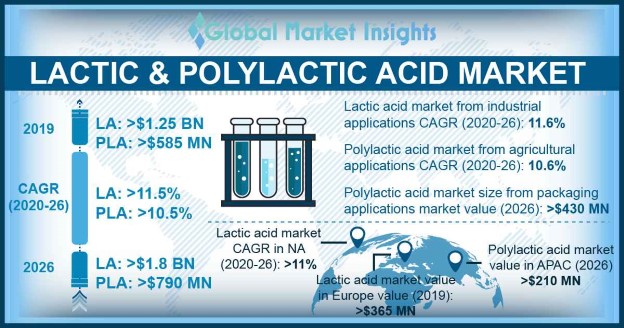Home > Chemicals & Materials > Specialty Chemicals > Custom Synthesis > Lactic Acid Market
Lactic Acid Market Size
- Report ID: GMI821
- Published Date: Jun 2020
- Report Format: PDF
Lactic Acid Market Size
Lactic acid market size exceeded USD 1.25 Billion, in 2019 and is estimated to grow at over 11.5% CAGR between 2020 and 2026. Growing demand for skincare products such as moisturizers and anti-aging products will propel the product demand.
style="text-align:justify">Lactic acid is a yellowish or colorless organic acid which is commercially produced by the bacterial fermentation of carbohydrates such as cornstarch, molasses, and potatoes. It is also produced naturally in muscle tissues during arduous exercise and is produced during the preparation of fermented food products such as sour milk, sauerkraut, and yogurt.
Lactic acid is primarily used as a preservative & flavoring agent in foodstuff, in textile printing and dyeing, & in pharmaceutical products.
| Report Attribute | Details |
|---|---|
| Base Year: | 2019 |
| Lactic Acid & Polylactic Acid Market Size in 2019: | 1.26 billion (USD) |
| Forecast Period: | 2020 to 2026 |
| Forecast Period 2020 to 2026 CAGR: | 11.5% |
| 2026 Value Projection: | 585.7 million (USD) |
| Historical Data for: | 2015 to 2019 |
| No. of Pages: | 255 |
| Tables, Charts & Figures: | 255 |
| Segments covered: | Application |
| Growth Drivers: |
|
| Pitfalls & Challenges: |
|
Lactic acid finds increasing adoption in cosmetic products owing to rising disposable income, changing consumer lifestyles and growing skincare concerns amidst changing climatic conditions & pollution which should stimulate lactic acid market demand. The product is well-suited for the formulation of hair dyes, colors, makeup, shampoos, cleansing products and moisturizers pertaining to its excellent exfoliation, collagen renewal, humectant and complex enhancement capabilities.
Increasing adoption of cosmetic products among men and growing consumer preference for natural & organic cosmetic ingredients should boost lactic acid industry growth.
Manufacturers are primarily involved in developing innovative production processes for lactic acid. For instance, Cargill has developed a unique biocatalyst which reduces environmental impacts and eliminates the requirement for expensive reagents in the production of lactic acid. This biocatalyst comprises of an innovative yeast which results in less gypsum waste generation and provides the company with competitive advantage.

